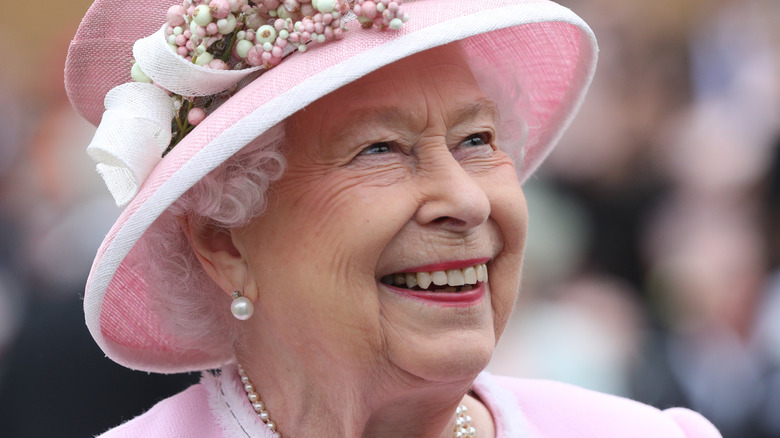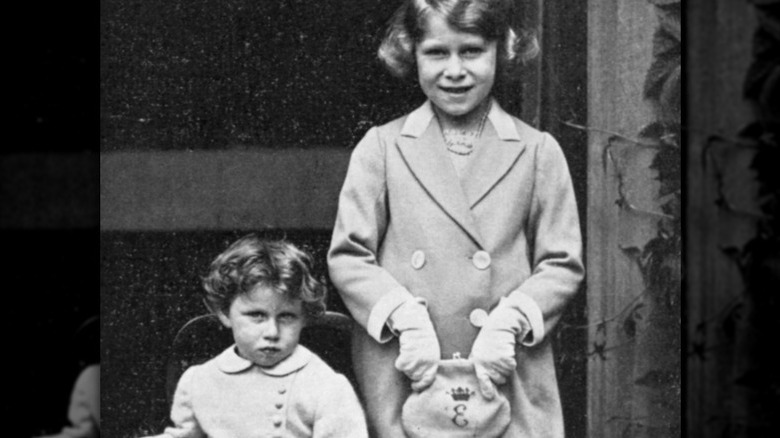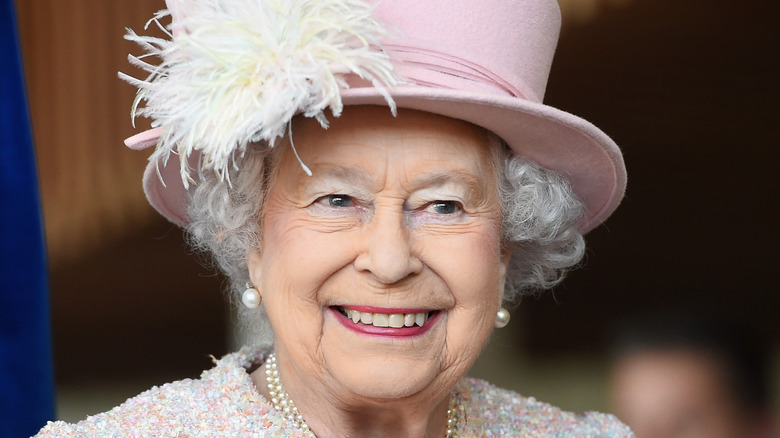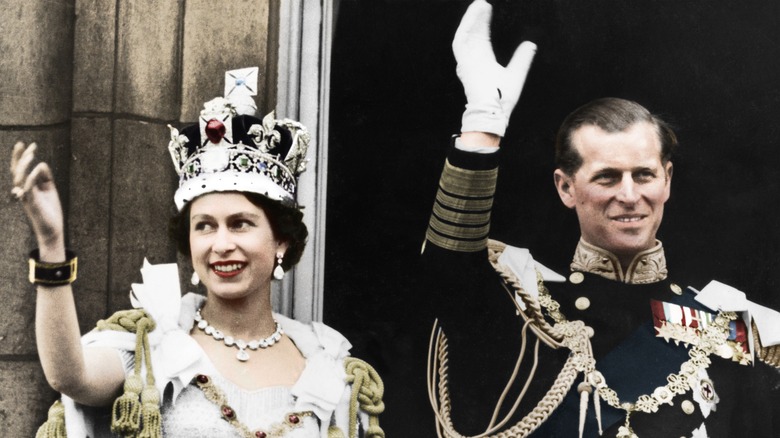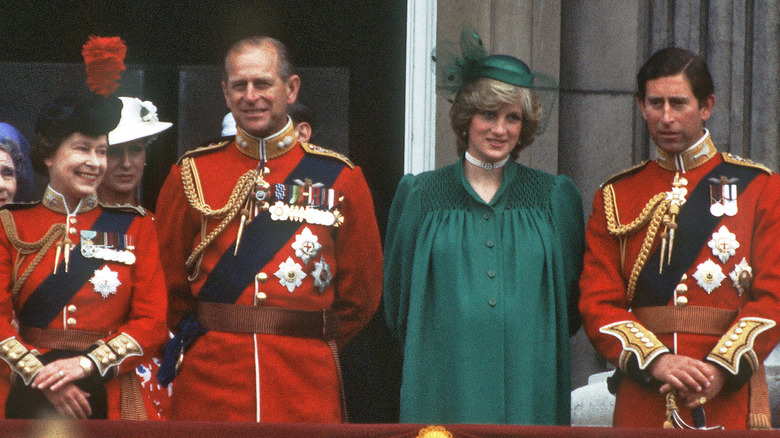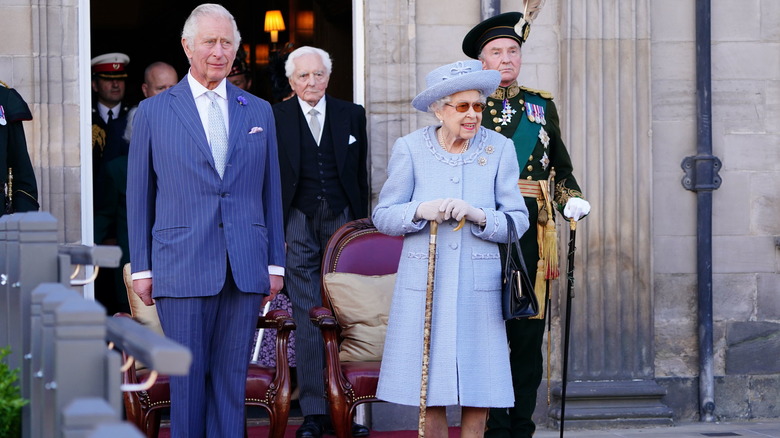The Tragic Death Of Queen Elizabeth II
Buckingham Palace announced the death of 96-year-old Queen Elizabeth II on September 8. According to History.com, the queen celebrated 70 years on the British throne in 2022 and is the longest-reigning British monarch. The queen was a beloved world leader known for her service, having upheld a long list of initiatives and charities throughout her tenure, as her royal bio notes.
The queen became monarch at the age of 25, after the premature death of her father on February 6, 1952. The queen's father, King George VI, was only 56 when he died. When she became queen, Elizabeth had only been married to Prince Philip for five years and then had two small children. In a Washington Post interview, royal expert Tina Brown said the queen "represents duty, service, you know, absolute sort of commitment to the British ideal of keep calm and carry on. She's the personification of it."
As the world mourns the queen's death, let's look back at her life and legacy.
Queen Elizabeth II's early years
Queen Elizabeth II, born in 1926 to the Duke and Duchess of York, never expected to take the throne. Her father was the second son of King George V, and her uncle was the heir to the British throne. The queen's sister Princess Margaret was born in 1930, and the girls lived a relatively normal life. The Duke and Duchess of York and the girls were a close family, with the queen's father referring to the family as "Us Four," per The Mirror. Another sweet detail? Queen Elizabeth referred to her grandfather King George V, as "Grandpa England," as royal author and historian Tracy Borman revealed during an appearance on the "Pod Save the Queen" podcast, per Express.
When her uncle, Edward VIII, abdicated from the British throne in 1936 to marry twice-divorced American Wallis Simpson, it changed everything for Queen Elizabeth as her father became king. The queen's mom, aka "Queen Mother," never got over the incident, supposedly holding resentment toward Wallis for creating a situation that put unexpected responsibilities on King George VI, according to The Guardian. But the queen's parents powered on, leading their country through dark times up until King George VI's death in 1952.
The curator of the Imperial War Museum in London, Kate Clements, reflected to Newsweek, "Princess Elizabeth was naturally quite serious and responsible, even when she was young and the war years really strengthened that aspect of her personality and provided the foundation of her later attitudes towards duty when she became queen."
Queen Elizabeth II put service and duty first
In April, royal expert Tina Brown explained to The Washington Post how important the British monarchy is to British culture, explaining, "It is the preeminent focus of national identity, national pride, history, tradition." The royal expert also noted Queen Elizabeth II was the heart of the monarchy. Brown said, "I mean, 70 years, we're talking–the representation of these kind of stoic British ideals, even if the reality of Britain has changed enormously."
The queen's reign was influenced by the example set by her parents, as Kate Clements, the curator of the Imperial War Museum in London, told Newsweek, "She [Elizabeth] saw what her parents were doing to boost people's morale, and she learned from that the importance of duty." When the queen turned 90, Editor in Chief of Majesty, Ingrid Seward, shared with Reuters, "The queen doesn't want to put her feet up. This is what she wants to do, and this is what she's going to do for as long as she's fit and able to do so."
In 2019, ABC News reported the 93-year-old queen did 67 public events. Compare that to Prince William (74) and Kate Middleton (58) the same year.
Queen Elizabeth II's devotion to Prince Philip and their family
Queen Elizabeth II and her third cousin Philip Mountbatten formally reconnected in 1939 when she was 13 and he was 18, connecting during a tour at the Royal Naval College. They soon struck up a correspondence, per Us Weekly. After World War II, the young couple became more serious. Us Weekly reported Philip proposed to the queen in 1946, and they married in November 1947. In a 2021 Christmas speech after his death, the queen fondly recalled, per ITV News, "That mischievous, enquiring twinkle was as bright at the end as when I first set eyes on him [Philip]."
The queen and Philip welcomed Charles, the first of their four children, in 1948, while his sister Anne arrived in 1950. When King George VI died in 1952, Elizabeth became queen. In a biography of the queen's successor, author Sally Bedell Smith wrote, "When Elizabeth became Queen on the death of her father, her dedication to her duties meant even less time for her children."
By the time the royal couple welcomed Prince Andrew in 1960, and later Prince Edward in 1964, Elizabeth had gained more experience as queen. As the Daily Mail reported, the queen was more present and hands on with her younger children. And of course, like many grandmothers, the queen doted on her grandchildren. "Behind closed doors, she's our grandmother, it's as simple as that," Prince Harry once told ABC's Katie Couric, per HuffPost.
Queen Elizabeth II's biggest controversies
Queen Elizabeth II served with few controversies during her reign, instead keeping the focus on service, and stated in a March 2022 speech that her existence would forever be rooted in giving back, according to USA Today. However, her tenure wasn't all positive headlines, especially after Princess Diana's death in August 1997. When the 36-year-old ex-wife of Prince Charles, Elizabeth's successor, was killed in a car accident, the queen's seeming lack of emotional response to Diana's death angered the British public.
However, the queen got the British people back in her corner when she made a live speech to the nation the day before Diana's funeral. According to Yahoo, the queen said in her address, "First, I want to pay tribute to Diana myself. She was an exceptional and gifted human being. In good times and bad, she never lost her capacity to smile and laugh, nor to inspire others with her warmth and kindness."
The other controversy surrounding the queen concerns her son Prince Andrew's friendship with Jeffery Epstein. The queen slapped Andrew with severe consequences in January after accuser Virginia Giuffre brought a civil lawsuit against him for alleged sexual assault. She stripped him of his royal patronages and military titles, sending a clear message.
Queen Elizabeth II's health issues kept her out of the public eye
Queen Elizabeth II seemed superhuman at times. But the death of Prince Philip in April 2021 and various health problems took a toll on the monarch. When the queen lost her husband of more than 70 years, a photo of the queen at Philip's funeral broke hearts worldwide, as the 95-year-old queen was sitting alone in the church pew. Then, in October 2021, royal watchers held their breath when the queen canceled a trip then stayed overnight in the hospital for "preliminary investigations," per The Guardian.
However, the United Kingdom was never more alarmed when in February the queen tested positive for COVID-19. Although the queen recovered from COVID, she continued to face health issues after battling the virus, and in a statement to Page Six, Buckingham Palace revealed she suffered "episodic mobility problems." As Healthline reported, some older adults have mobility problems post-virus.
The queen continued to miss more public appearances in the spring, but the Platinum Jubilee signaled a big change. The queen missed multiple events of the "Jubby" and royal expert Michael Cole summed up the feelings of many after the celebration. Cole wrote for Express,"The final balcony scene conveyed a stark message: change is coming. Even as a tremendous wave of affection swept her way, it was almost as if the Queen were waving goodbye."

